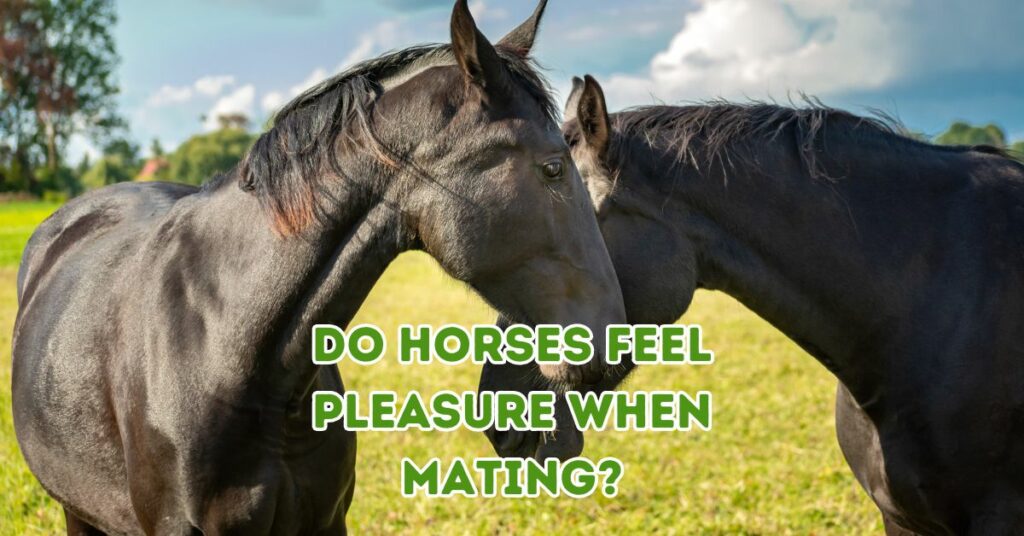As an Amazon Associate we earn from qualifying purchases.
Horses, unlike humans, do not experience pleasure in the same way during mating. While they may exhibit certain behaviors and physical responses during copulation, it is important to note that their mating rituals are primarily driven by instinct and reproductive necessity.
Horses lack the complex emotional and psychological aspects that contribute to the human experience of pleasure during sexual activity. Instead, their mating behaviors are deeply rooted in their evolutionary history, geared towards ensuring the survival of their species. The physiological responses observed in horses are more aligned with reproductive mechanisms and the fulfillment of natural instincts rather than the nuanced emotional and sensory experiences that characterize human sexual pleasure.
Equine Reproduction: A Detailed Overview
The Biological Process
In understanding whether horses feel pleasure when mating, it’s crucial to grasp the biological process. Horses engage in mating primarily for procreation rather than pleasure. LSI Keywords: equine reproduction, mating behavior, biological imperative.
Reproductive Instincts
Horses’ reproductive instincts are driven by the need to propagate their species. This primal urge is devoid of the pleasure aspect, focusing solely on ensuring the survival of their genetic lineage.
Mating Rituals
While horses exhibit specific mating rituals, these behaviors are more about the reproductive process and less about experiencing pleasure. Understanding these rituals sheds light on the innate biological drive that governs their actions.
Debunking Common Myths
Myth 1: Horses Share Human-Like Pleasure
Contrary to anthropomorphism, where human traits are attributed to animals, horses do not experience pleasure akin to humans during mating. LSI Keywords: equine myths, anthropomorphism, debunking beliefs.
The Danger of Anthropomorphism
Projecting human emotions onto animals can lead to misunderstandings. Horses have unique instincts and behaviors that should be interpreted through an equine lens, avoiding undue assumptions about their experiences.
Myth 2: Vocalizations Indicate Pleasure
Some may interpret horse vocalizations during mating as signs of pleasure. However, these sounds are more likely expressions of discomfort, signaling the physical effort involved in the mating process.
Understanding Equine Behavior
Instinct vs. Pleasure
Distinguishing between instinctual behaviors and pleasure-driven actions is crucial. Horses operate primarily on instinct, ensuring the continuation of their species, rather than seeking pleasure in the mating act. LSI Keywords: equine behavior, instincts vs. pleasure.
Scientific Insights
Scientific studies support the notion that horses lack the neurological capacity for experiencing pleasure in the same way humans do. The absence of certain brain structures indicates a different physiological response to mating.
Exploring Equine Sensations
Physical Sensations
While horses may experience physical sensations during mating, these are linked to reproductive processes rather than pleasure. Understanding the distinctions in equine anatomy and physiology provides clarity on this aspect.
The Role of Hormones
Hormonal changes play a significant role in guiding equine behavior during mating. These changes are geared towards successful reproduction, highlighting the biological imperative that governs their actions.
Common Misconceptions
Addressing common misconceptions is crucial in providing a comprehensive understanding. LSI Keywords: equine reproduction myths, dispelling misconceptions.
Lack of Emotional Connection
Unlike humans, horses don’t form emotional connections during mating. Their interactions are driven by instinct and the biological need to reproduce, devoid of emotional or pleasure-driven components.
Frequently Asked Questions
Do Horses Experience Pleasure in Mating?
Horses do not experience pleasure in the same way humans do during mating. Their behaviors are primarily instinctual, focused on procreation.
Can Vocalizations Indicate Pleasure?
No, vocalizations during horse mating are more likely expressions of physical effort rather than indicators of pleasure.
Do Horses Form Emotional Bonds Through Mating?
Horses do not form emotional bonds through mating. Their interactions are rooted in reproductive instincts rather than emotional connections.
What Scientific Evidence Supports the Lack of Pleasure in Horse Mating?
Scientific studies highlight the absence of specific brain structures in horses, indicating a different physiological response to mating.
How Do Hormonal Changes Affect Equine Behavior During Mating?
Hormonal changes guide equine behavior, ensuring successful reproduction. These changes are geared towards the biological imperative of sustaining their species.
Final Thoughts
In concluding our exploration of whether horses feel pleasure when mating (they don’t), it’s evident that equine behavior is rooted in biological imperatives rather than pleasure-seeking motives. Dispelling myths and understanding the science behind horse mating enhances our appreciation for these magnificent creatures. The intricacies of their reproductive process reflect the marvels of nature, reminding us to interpret their actions with a discerning eye.
Amazon and the Amazon logo are trademarks of Amazon.com, Inc, or its affiliates.

Hey there, I’m Jasmine! I’m a total horse fanatic and have been working with these amazing animals for as long as I can remember. I’m passionate about sharing my love for horses with others and helping them learn more about these majestic creatures. As a professional horse trainer and riding instructor, I’ve developed a deep understanding of equine science and am committed to the welfare of horses. That’s why I founded OwnTheHorse.com, a blog where I share my knowledge and insights with fellow horse enthusiasts. I love connecting with my readers and building a friendly community of horse lovers. Whether you’re a seasoned equestrian or just starting out, I’m here to help and inspire you. Above all, I’m a friendly and compassionate person who truly cares about the well-being of horses and their human companions.

